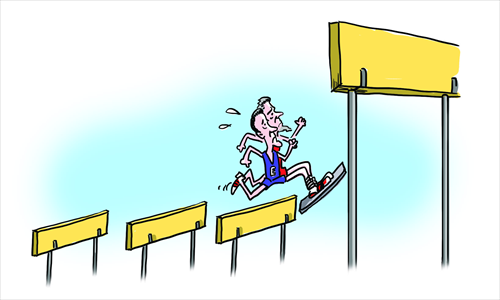Washington-Brussels FTA proposal a source of concern for Beijing

Illustration: Liu Rui/GT
After a period of tension from 2000 until 2008 due to serious disagreements over the use of military force in international politics, relations between Washington and Brussels have returned to normalcy.
Relative multilateralism in foreign affairs and frameworks of cooperation at the economic level are the principal parameters of the partnership. This emphasis is not surprising, as the US and the EU attempt to recover from the worst financial crisis since the Great Depression.
However, a heated debate exists regarding policy responses to the ongoing crisis. The US Treasury Secretary Jack Lew and his German counterpart Wolfgang Schäuble, for instance, advocate contradictory policies in dealing with the problem. While the former supports the idea of stimulus packages to relaunch national economies, the latter focuses on the importance of austerity for the reduction of deficits.
Despite these different schools of thought, it is in their interests to work together. The launch of negotiations for the creation of a free trade area between the US and the EU is certainly placed within this context.
It is not a new policy recommendation. In 1995, the New Transatlantic Agenda paved the way for a single market while a few years later, instruments such as the Transatlantic Economic Council started to deal with issues of effectiveness and transparency.
The financial crisis has accelerated the process, which is also being promoted by the work of research organizations including the German Marshall Fund and the European Centre for International Political Economy.
Emphasizing the importance of the proposed free trade area, some scholars observe that it can be similar to an economic North Atlantic Treaty Organization (NATO).
According to the plan, barriers, restrictions and tariffs will be removed, growth will be boosted and thousands, if not millions, of new jobs will be created. It is perhaps no coincidence that the German carmaker BMW, which is looking for cheaper energy resources, has already decided to build a plant in Washington.
Of course, the potential creation of a free trade area between the US and the EU will not only affect trade for the two sides, but also for many other countries which will naturally not participate in the new project. A study by the Munich-based Institute for Economic Research demonstrates that world trade volume will be redirected rather than increased.
To put it bluntly, countries such as China might experience significant losses because its products will become much more expensive. Taking into account the fact that US President Barack Obama is also endeavoring to forge the so-called Trans-Pacific Partnership, it seems that Washington arguably seeks to contain Beijing's peaceful rise.
The EU is aware of China's concerns that the discussed free trade area will contain elements of protectionism. A complementary free trade agreement between Brussels and Beijing might be sufficient to appease those fears. Reuters has already published an exclusive story on the terms for deepening economic cooperation between the EU and China.
Various scenarios have started to be put on the table in view of a potential creation of an economic NATO. Nevertheless, it is still too early to gauge the future impact of such a development, because its successful realization cannot be taken for granted.
In the first instance, there are still significant issues to be settled. These days, for example, the French media largely concentrate on the cultural concerns of the country's film industry should trade liberalization between the two continents take place.
Further to this, although European policymakers consider the breakup of the eurozone a nightmare scenario of the past and now express their optimism for future years, risks have not been definitively averted.
Much more time will be required for the new trade agreement between the US and the EU to be concluded. For now, it seems a giant step in terms of concept, but a baby step in terms of implementation.
In any case, the good news for affected countries of the world is that they have plenty of time to set up a pre-emptive strategy at the economic level and expand their diplomatic alliances to defend their interests. China may be the best example.
The author is a research fellow at the Hellenic Foundation for European and Foreign Policy. opinion@globaltimes.com.cn